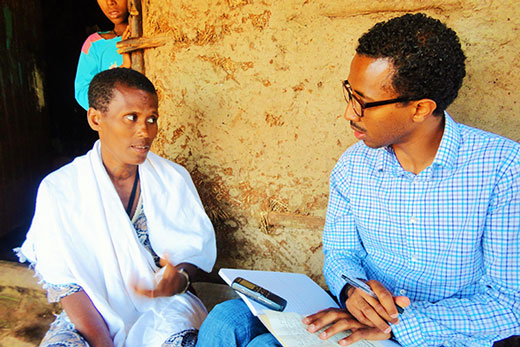When Philip Wainwright was named vice provost of international affairs and director of The Halle Institute for Global Learning at Emory, his first order of business was to take a fresh look at Emory’s global strategy. That work culminated this week with the release of “A Global Vision for Emory,” created with broad community input and designed to guide Emory’s international engagement for the next five years.
In the international sphere, there was much to consider — from the growth of global research collaborations among faculty to how to best utilize the resources and talents of Emory’s existing international student body, which now reflects an expanding range of nations, Wainwright says.
A decade ago, he notes, international students represented 4.5 percent of the student body. Now that overall number is 17 percent; this fall’s incoming class of first-year students was closer to 20 percent, which mirrors national trends.
Wainwright says the university has also seen a marked shift in both Emory’s profile abroad and the number of international scholars who seek to partner with Emory faculty. In 2002, for example, 19 percent of Emory scholarly publications had an international co-author; today, that number is closer to 33 percent.
In fact, Emory currently has more than 200 active international agreements governing research and exchanges, he adds.
In today’s competitive academic environment, that kind of global visibility matters. “Publications that have an international co-author are cited, on average, three times more than publications that have only U.S. authors,” Wainwright says.
Wainwright sees those trends providing multiple benefits: Students come to Emory in search of a world-class education, while the campus community, faculty and classrooms reap the rewards of a broader global perspective.
“There’s clearly a commitment at Emory to supporting a significant international student population and global scholarship — it enriches our campus and our research mission,” says Wainwright.
Benefits of global engagement
Despite the changing landscape, Wainwright discovered that Emory’s global strategic vision had not been updated in nearly a decade.
In October 2013, the Office of International Affairs (OIA), which has now been renamed the Office of Global Strategy and Initiatives (GSI), assembled a task force comprised of faculty members from all Emory schools and representatives from most administrative units to revisit the university’s strategy for global engagement — a vision further refined through campus presentations, community feedback and a faculty survey to help pinpoint geographical priorities.
Many task force members were faculty actively engaged in international research, says Jeffrey Lesser, Samuel Candler Dobbs Professor and chair of Emory’s history department, who served on the task force.
With an emphasis on research and education, “we brought to the table skilled researchers who need to travel and are deeply embedded in their work — and that was important,” Lesser says. “There are so many scholars at Emory working on so many international research topics. A great university wants to offer structures and resources to encourage that.”
That experience-based input was critical, says Carlos del Rio, professor and chair of the Hubert Department of Global Health, professor of medicine and co-director of the Emory Center for AIDS Research, who also served on the task force.
“The international work of the university has grown in a significant way, faster than the programs to support it,” he says. “The question is ‘How do we support it better?’”
With that goal in mind, the task force has identified three major strategic goals as part of the “Global Vision for Emory.”
- Equip students to meet the opportunities and challenges of an increasingly interconnected world.
- Lead and influence global scholarship, research, and teaching.
- Position Emory as a university known for its global impact.
Included within a broad series of proposed initiatives, the task force recommends strengthening faculty support for international research and scholarship, enhancing international student recruitment and on-campus support, and empowering international alumni to serve as global ambassadors.
In order to build upon Emory’s existing international partnerships and increase international student diversity, the task force also recommends focusing on strategic engagement with priority locations, including Brazil, China, Ethiopia, India, and South Korea.
Support for faculty, students
Although opportunities for international engagement already exist within all schools and most academic departments — about 40 percent of graduating Emory seniors enjoy some type of study-abroad experience — Wainwright notes that in few cases are those experiences required or fully integrated into degree programs.”
Under the new strategic goals, more attention will be given to assessing, promoting and supporting those opportunities for both students and faculty, he says.
In fact, the recent launch of his office’s new Global Services resource, under the direction of Chris Rapalje, is intended to offer a single point of contact for faculty members interested in issues related to international work, including research and partnerships, tracking current scholarship and planning global projects.
“This strategy provides a blueprint for what Emory wants to be,” says Del Rio. “That was the idea — to come up with services and resources the faculty can use to improve their ability to do international research.”
Wainwright also envisions the GSI offering help in locating grant funding to facilitate international faculty exchanges or explore online and distance learning opportunities. Plans are already being made to create and maintain a global engagement database for Emory faculty.
“Emory does a tremendous amount of work internationally,” Wainwright says. “One way to communicate that is to pull together the resources we have and let people know what we’re doing.”
Under the revised strategy, the GSI will also look at developing a campus-based Global Center — an idea still being conceptualized — to help consolidate cross-cultural and globally oriented student programming, Wainwright says.

